PCOD! This word has become a topic of discussion in almost every girls group. Even if one is not suffering from it, one tends to hear about it from women who have been trying hard to beat PCOD. Almost one-third of the women around the globe suffer from PCOD or Polycystic Ovarian Disease.
PCOD or Polycystic Ovarian Disease is a set of symptoms present in women due to imbalance in hormones. PCOS or Polycystic Ovarian Syndrome is an endocrinological and metabolic disorder and the set of symptoms are related to higher level of androgens or male hormones in female’s body.
Small cysts develop in one or both the ovaries of women suffering from PCOD as ovaries are not able release the mature egg or ovum produced each month i.e. ovulation does not happen. These eggs accumulate and remain as cysts filled with fluid inside the ovary. In some cases of PCOS, mature eggs may not be produced and ovaries can develop small fluid-filled cysts. These cysts produce androgens or male hormones and are thus responsible for rise in male hormones in cases of PCOS.
The exact cause of PCOS or PCOD has not been identified. A combination of two factors has been associated with onset of PCOS or Polycystic Ovarian Syndrome:
-
Genetic Factors: The genes you inherit play a vital role in determining the diseases or syndromes you suffer from in your life. If you have someone suffering from PCOS in your family, you are likely to suffer from it too in your reproductive age. 20% to 40% of women with PCOS have a mother or sister who has PCOS.

- Environmental Factors: Being overweight or obese puts you at risk of suffering from PCOD. The other factors that contribute include lack of physical activity, insulin resistance, stress, and anxiety.
Let us have a look at the signs and symptoms a woman with PCOS suffers from:
-
Irregular Periods: Women normally have periods every month except in pregnancy and lactation in their reproductive age i.e. from menarche to menopause. In case of PCOS, women may have no monthly periods for three or more consecutive months or may have fewer than nine periods in a year. Some women may also have heavy and prolonged monthly periods due to increased level of male hormones.
-
Infertility: Due to lack of ovulation i.e. release of mature egg from one of the ovaries each month, the eggs cannot be fertilized by sperms to produce a baby. This makes PCOS one of the reasons of infertility in women.
-
Increased Level of Male Hormones in Female: It is known as hyperandrogenism. This increase in male hormones in a female’s body is responsible for acne and male pattern of hair growth such as on chin or chest in a woman with PCOS.
-
Metabolic Syndrome: PCOS makes women suffer from metabolic syndrome. At least three of five symptoms including abdominal obesity, high blood pressure, high blood sugar, high serum triglycerides, and low HDL are present.
Mostly, women with PCOS suffer from obesity. However, the possibility of thin women suffering from PCOS cannot be completely ruled out.
Let us now identify the herbs that have been combined to form Boosthealth Tablets, which help women who suffer from PCOS or PCOD:
-
Curcumin: Though bright yellow in colour, curcumin is an ever-green herb. The healing effects of curcumin in PCOS or PCOD cannot be undermined. In a research published in Asian Pacific Journal of Reproduction in April 2016, it was concluded that curcumin was able to normalize the increased level of male hormone testosterone with the same intensity like Clomiphene Citrate, a medicine used to treat infertility in women who do not release mature eggs every month. According to the same research, curcumin is able to restore the decreased level of female hormones such as progesterone and oestrogen to normal level in PCOS. Oral administration of curcumin also controls high blood glucose in PCOS and normalises lipid profile by decreasing triglycerides and bad cholesterol and increasing good cholesterol. It also lowers the risk of high blood pressure in PCOS, reduces oxidative damage in body and gradually works to dissolve the cysts accumulated in ovaries. Curcumin also helps in regularizing ovulation and monthly periods.

-
Shatavari: It is a great source of vitamins A, B1, B2, C, E, folic acid, and minerals such as magnesium, phosphorus, calcium and iron. Therefore, shatavari prevents oxidative damage in PCOS. It also improves insulin sensitivity and decreases the risk of diabetes in women suffering from PCOS. In women when PCOS acts as a cause for infertility, it helps in eliminating PCOS and regularising monthly periods to restore fertility. It is also helpful in decreasing pain during periods.
- Ashwagandha: Ashwagandha is helpful in recovery of missing periods, especially when stress and anxiety have been the contributors to onset of PCOS. Ashwagandha is rich in minerals and therefore helps in enhancing communication between the parts of endocrine system or the chemical messenger system involved in production of hormones for regularizing monthly periods and improving fertility.
These herbs, in appropriate combination, play a role in restoring good health in PCOS or PCOD and regularising monthly periods. Life with PCOD is difficult. Boosthealth Tablets make it easier for women to defeat PCOD and get back to normal!






